Abstract
1 A method for the assay of debrisoquine 4-hydroxylase activity in vitro by microsomal fractions of human liver is described. The assay utilises gas chromatography-mass spectrometry with d9-4-hydroxydebrisoquine as internal standard. 2 The limit of detection of 4-hydroxydebrisoquine was 2 ng ml -1 and the coefficient of variation was 4.4%. 3 Debrisoquine 4-hydroxylase activity was linear with protein to concentrations above 2.1 mg ml -1 and with incubation times of at least 15 min. 4 Debrisoquine 4-hydroxylase is a microsomal enzyme with a requirement for NADPH. Activity was inhibited by carbon monoxide. It is concluded that the activity is catalysed by cytochrome P-450. 5 In three samples of human liver the mean value for Vmax of debrisoquine 4-hydroxylase activity was 69.9 +/- 14.3 pmol mg -1 min -1 and for Km it was 130 +/- 24 microM. 6 The only variable from smoking status, alcohol ingestion, sex of the patients, source of liver sample and presence of liver disease that had a significant effect on 4-hydroxylation of debrisoquine was the presence of liver disease. This was associated with a decrease in enzyme activity.
Full text
PDF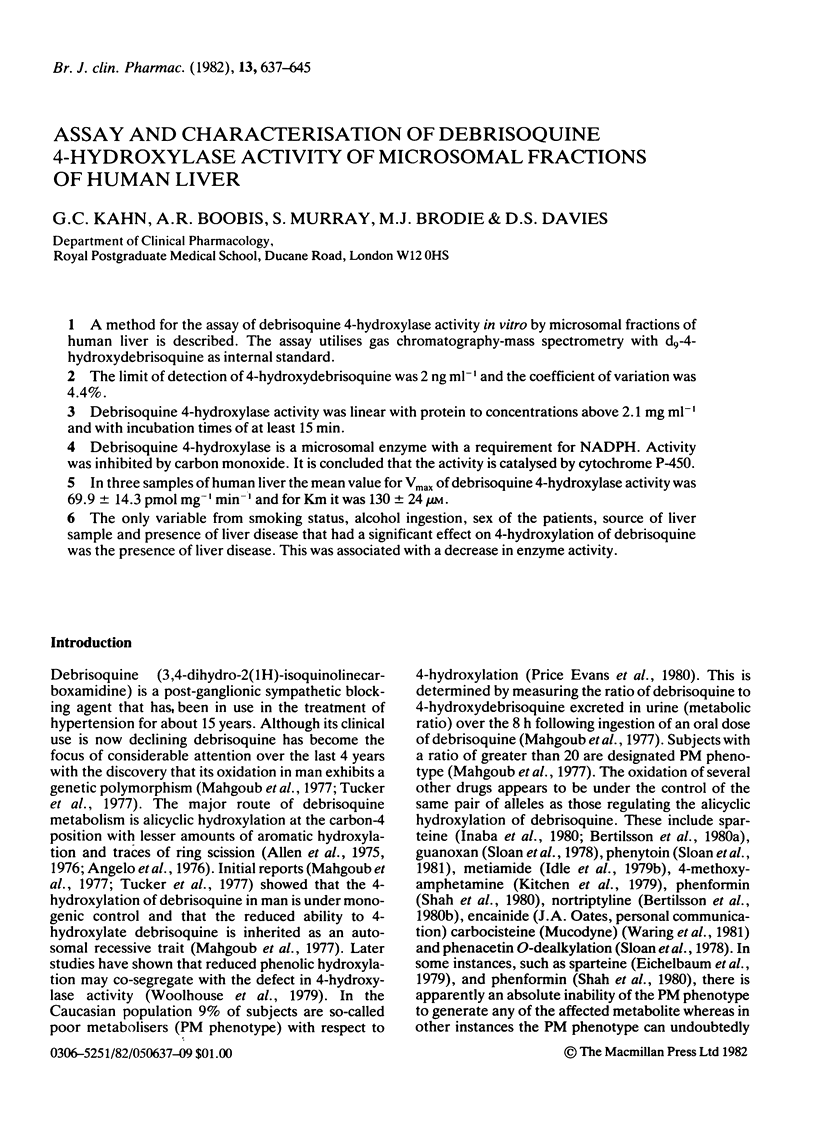
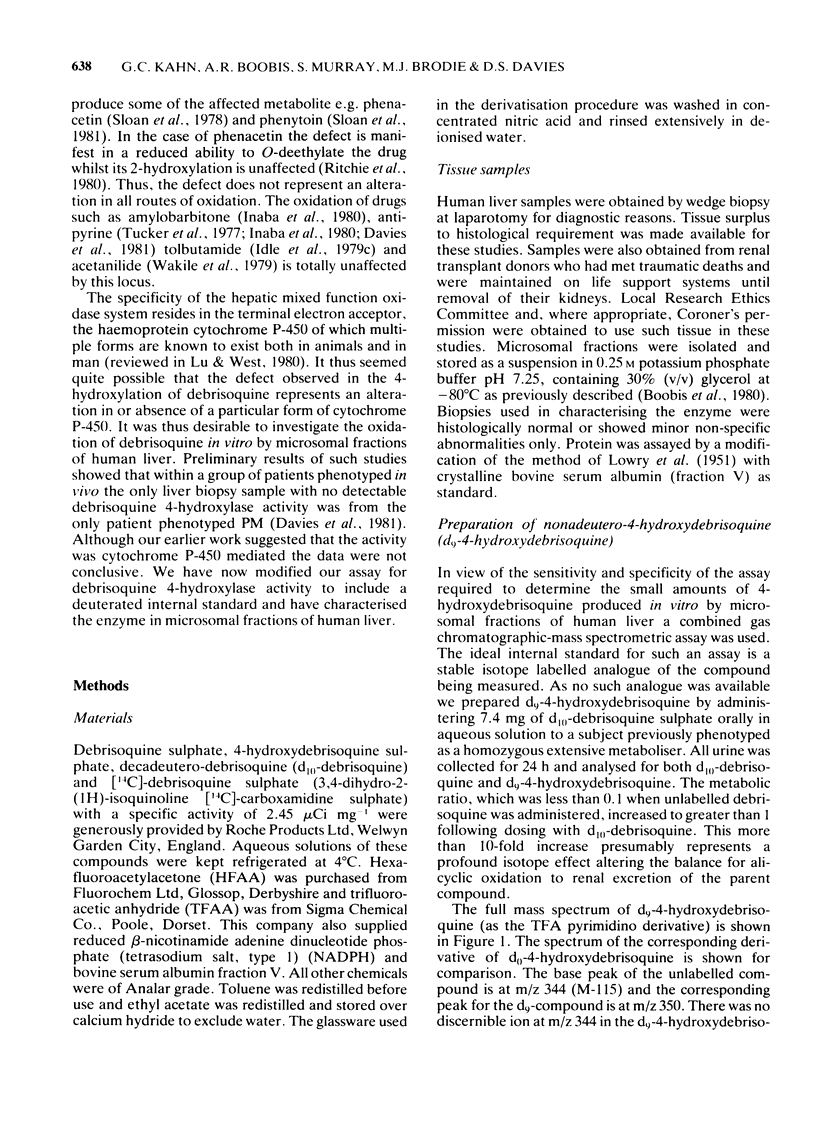
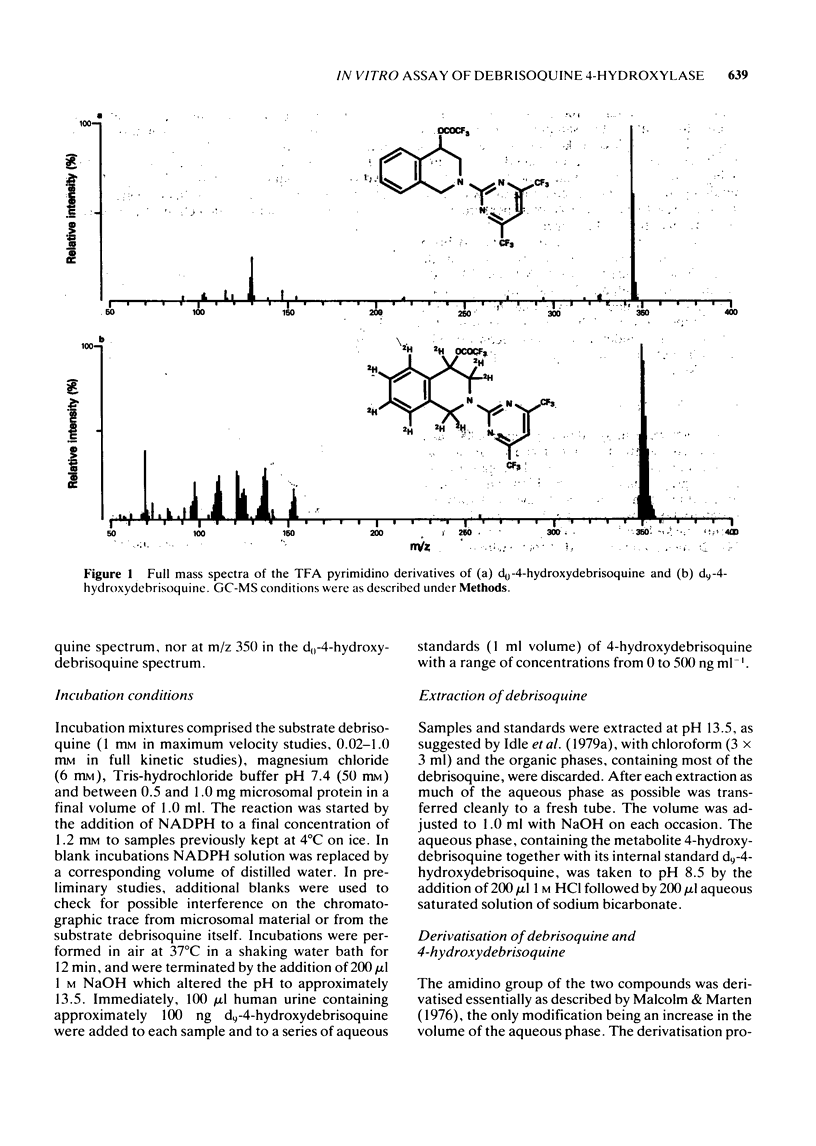
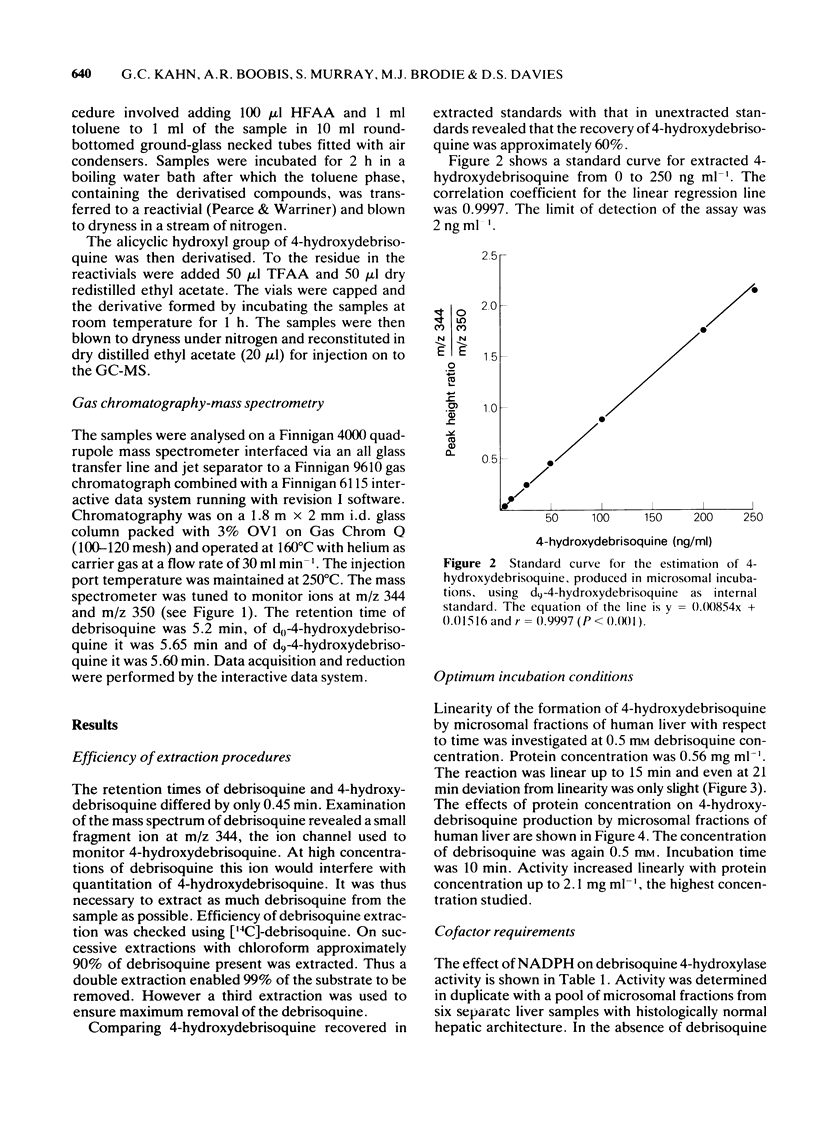
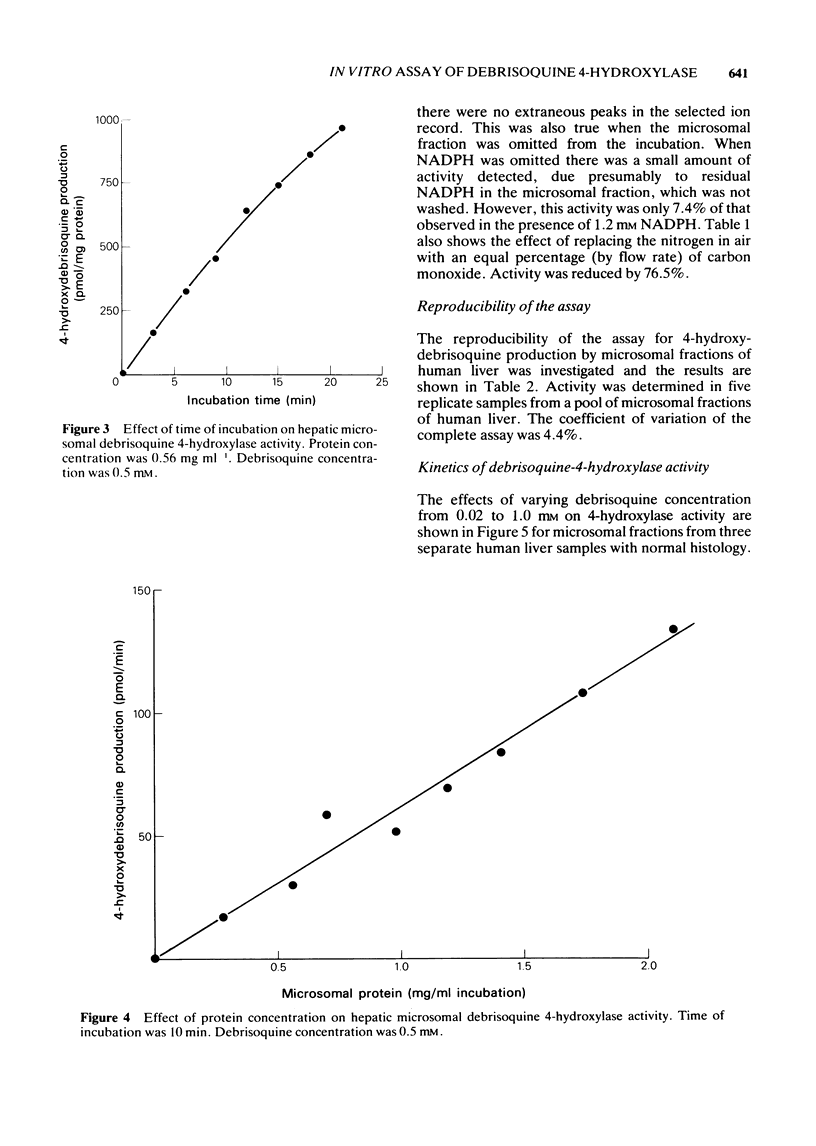
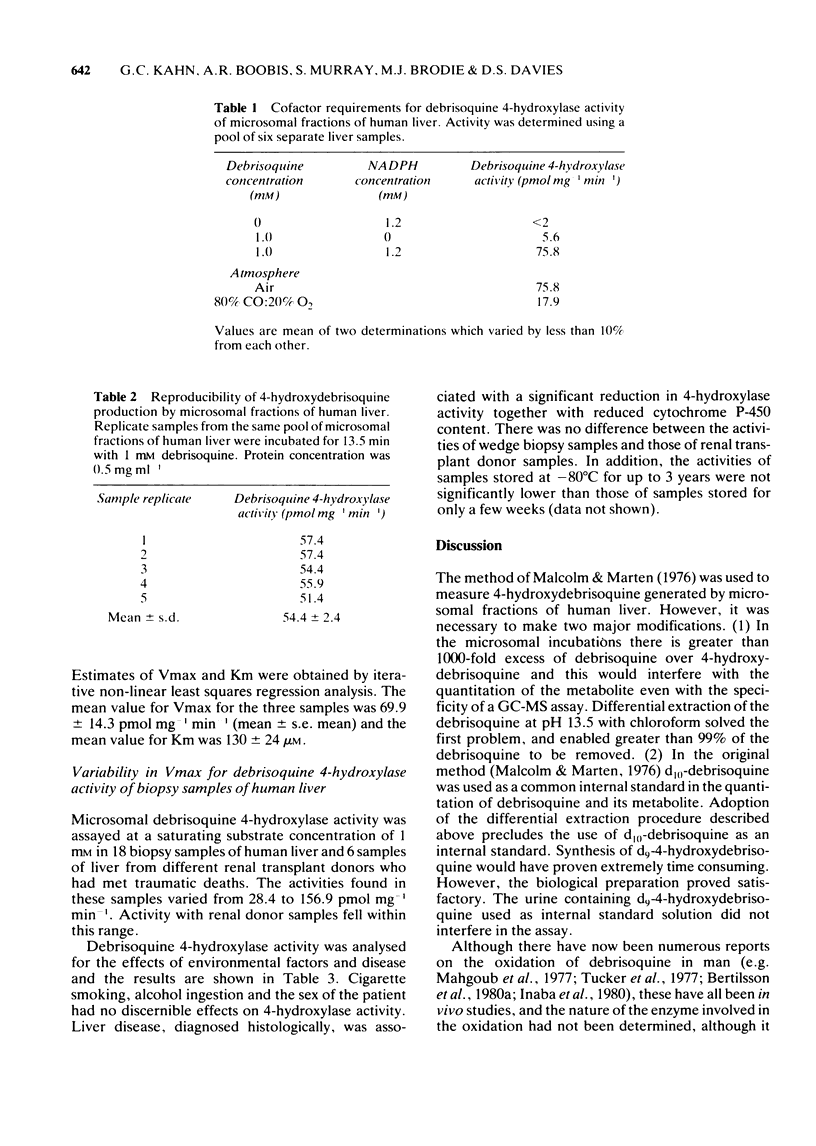
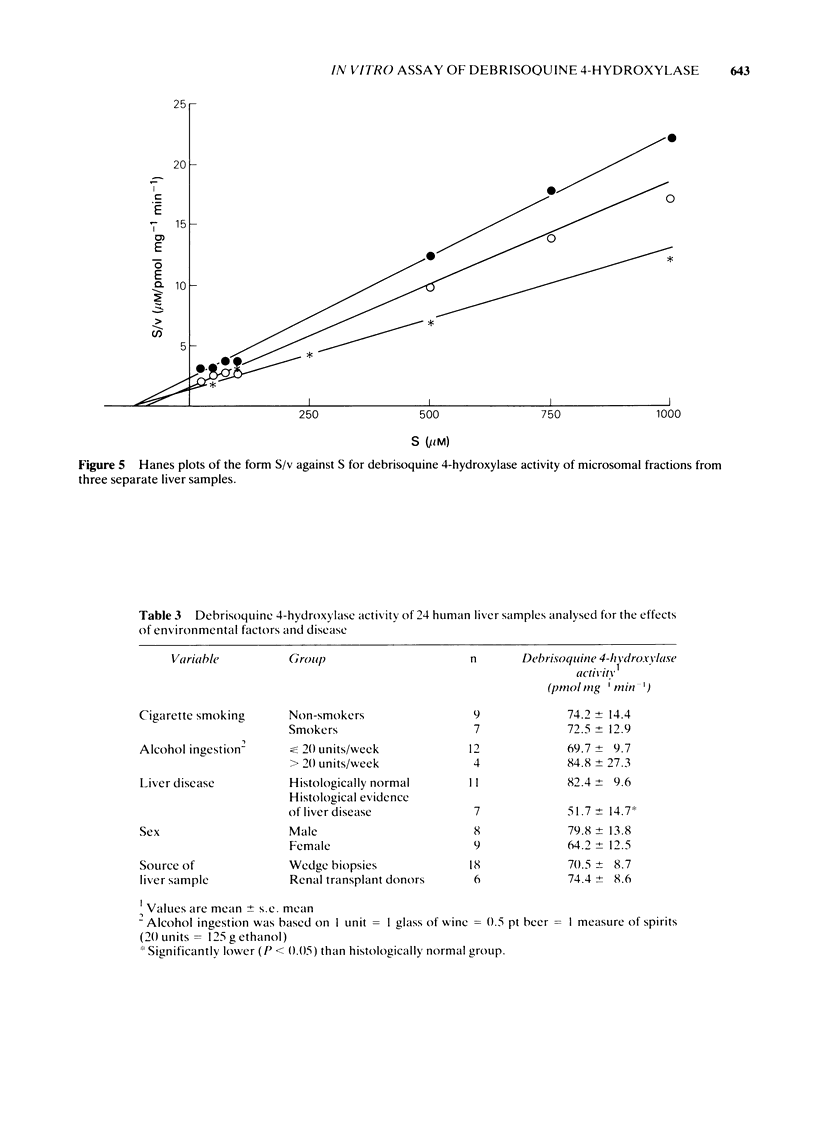
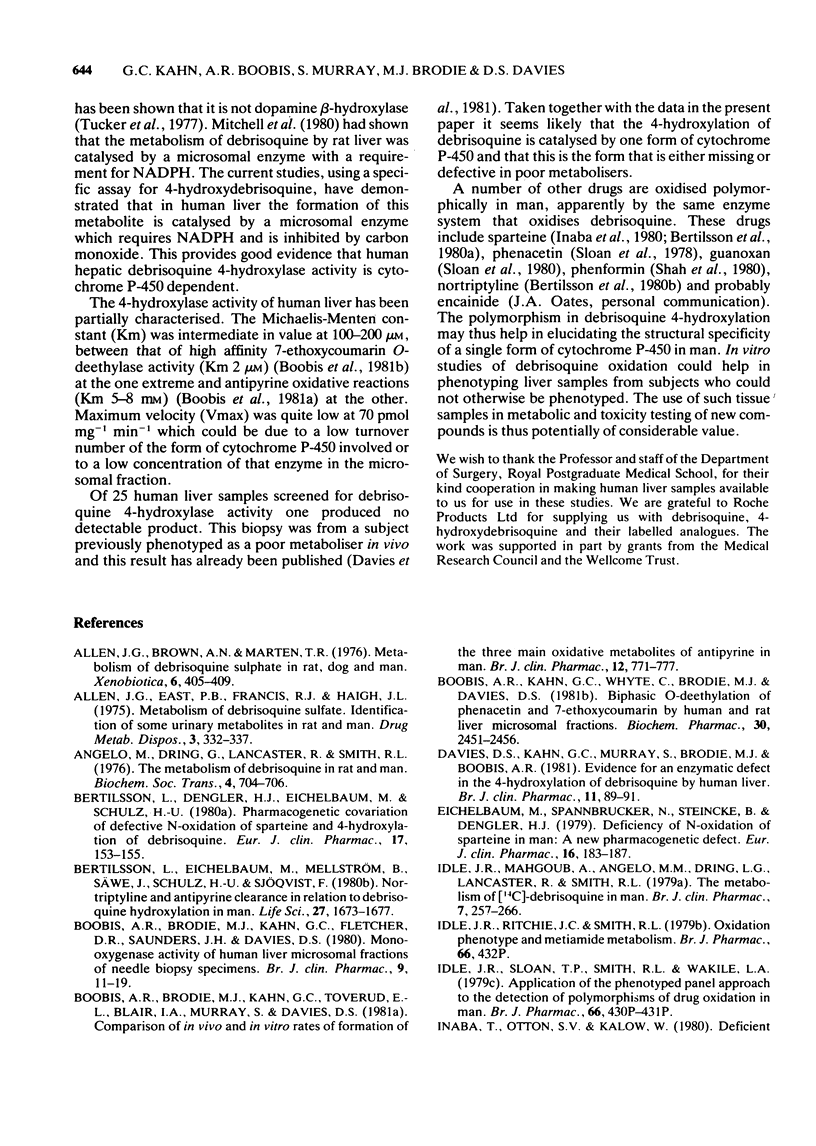
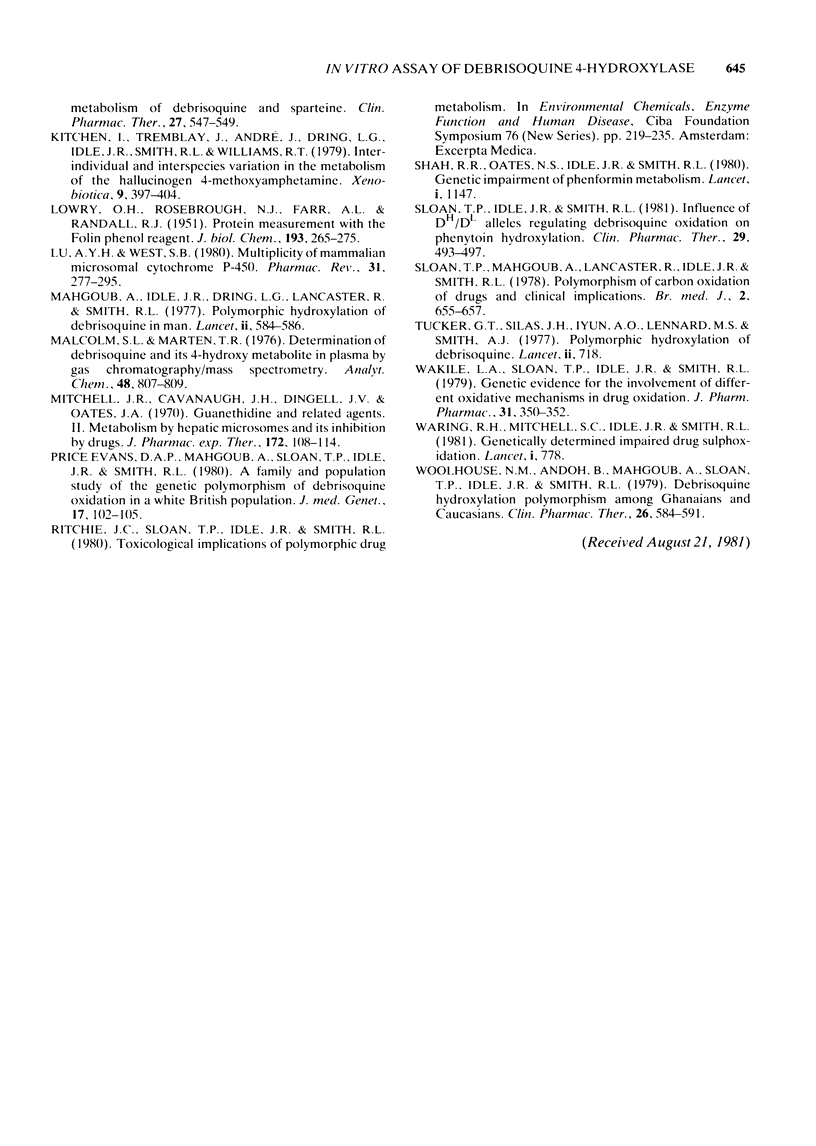
Selected References
These references are in PubMed. This may not be the complete list of references from this article.
- Allen J. G., Brown A. N., Marten T. R. Metabolism of debrisoquine sulphate in rat, dog and man. Xenobiotica. 1976 Jul;6(7):405–409. doi: 10.3109/00498257609151653. [DOI] [PubMed] [Google Scholar]
- Allen J. G., East P. B., Francis R. J., Haigh J. L. Metabolism of debrisoquine sulfate. Identification of some urinary metabolites in rat and man. Drug Metab Dispos. 1975 Sep-Oct;3(5):332–337. [PubMed] [Google Scholar]
- Angelo M., Dring L. G., Lancaster R., Smith R. L. The metabolism of debrisoquine in rat and man. Biochem Soc Trans. 1976;4(4):704–706. doi: 10.1042/bst0040704. [DOI] [PubMed] [Google Scholar]
- Bertilsson L., Dengler H. J., Eichelbaum M., Schulz H. U. Pharmacogenetic covariation of defective N-oxidation of sparteine and 4-hydroxylation of debrisoquine. Eur J Clin Pharmacol. 1980 Feb;17(2):153–155. doi: 10.1007/BF00562624. [DOI] [PubMed] [Google Scholar]
- Bertilsson L., Eichelbaum M., Mellström B., Säwe J., Schulz H. U., Sjöqvist F. Nortriptyline and antipyrine clearance in relation to debrisoquine hydroxylation in man. Life Sci. 1980 Nov 3;27(18):1673–1677. doi: 10.1016/0024-3205(80)90642-6. [DOI] [PubMed] [Google Scholar]
- Boobis A. R., Brodie M. J., Kahn G. C., Fletcher D. R., Saunders J. H., Davies D. S. Monooxygenase activity of human liver in microsomal fractions of needle biopsy specimens. Br J Clin Pharmacol. 1980 Jan;9(1):11–19. doi: 10.1111/j.1365-2125.1980.tb04790.x. [DOI] [PMC free article] [PubMed] [Google Scholar]
- Boobis A. R., Brodie M. J., Kahn G. C., Toverud E. L., Blair I. A., Murray S., Davies D. S. Comparison of the in vivo and in vitro rates of formation of the three main oxidative metabolites of antipyrine in man. Br J Clin Pharmacol. 1981 Dec;12(6):771–777. doi: 10.1111/j.1365-2125.1981.tb01305.x. [DOI] [PMC free article] [PubMed] [Google Scholar]
- Davies D. S., Kahn G. C., Murray S., Brodie M. J., Boobis A. R. Evidence for an enzymatic defect in the 4-hydroxylation of debrisoquine by human liver. Br J Clin Pharmacol. 1981 Jan;11(1):89–91. doi: 10.1111/j.1365-2125.1981.tb01108.x. [DOI] [PMC free article] [PubMed] [Google Scholar]
- Eichelbaum M., Spannbrucker N., Steincke B., Dengler H. J. Defective N-oxidation of sparteine in man: a new pharmacogenetic defect. Eur J Clin Pharmacol. 1979 Sep;16(3):183–187. doi: 10.1007/BF00562059. [DOI] [PubMed] [Google Scholar]
- Evans D. A., Mahgoub A., Sloan T. P., Idle J. R., Smith R. L. A family and population study of the genetic polymorphism of debrisoquine oxidation in a white British population. J Med Genet. 1980 Apr;17(2):102–105. doi: 10.1136/jmg.17.2.102. [DOI] [PMC free article] [PubMed] [Google Scholar]
- Idle J. R., Mahgoub A., Angelo M. M., Dring L. G., Lancaster R., Smith R. L. The metabolism of [14C]-debrisoquine in man. Br J Clin Pharmacol. 1979 Mar;7(3):257–266. doi: 10.1111/j.1365-2125.1979.tb00930.x. [DOI] [PMC free article] [PubMed] [Google Scholar]
- Idle J. R., Ritchie J. C., Smith R. L. Oxidation phenotype and metiamide metabolism [proceedings]. Br J Pharmacol. 1979 Jul;66(3):432P–432P. [PMC free article] [PubMed] [Google Scholar]
- Idle J. R., Sloan T. P., Smith R. L., Wakile L. A. Application of the phenotyped panel approach to the detection of polymorphism of drug oxidation in man [proceedings]. Br J Pharmacol. 1979 Jul;66(3):430P–431P. [PMC free article] [PubMed] [Google Scholar]
- Inaba T., Otton S. V., Kalow W. Deficient metabolism of debrisoquine and sparteine. Clin Pharmacol Ther. 1980 Apr;27(4):547–549. doi: 10.1038/clpt.1980.77. [DOI] [PubMed] [Google Scholar]
- Kitchen I., Tremblay J., André J., Dring L. G., Idle J. R., Smith R. L., Williams R. T. Interindividual and interspecies variation in the metabolism of the hallucinogen 4-methoxyamphetamine. Xenobiotica. 1979 Jul;9(7):397–404. doi: 10.3109/00498257909038744. [DOI] [PubMed] [Google Scholar]
- LOWRY O. H., ROSEBROUGH N. J., FARR A. L., RANDALL R. J. Protein measurement with the Folin phenol reagent. J Biol Chem. 1951 Nov;193(1):265–275. [PubMed] [Google Scholar]
- Lu A. Y., West S. B. Multiplicity of mammalian microsomal cytochromes P-45. Pharmacol Rev. 1979 Dec;31(4):277–295. [PubMed] [Google Scholar]
- Mahgoub A., Idle J. R., Dring L. G., Lancaster R., Smith R. L. Polymorphic hydroxylation of Debrisoquine in man. Lancet. 1977 Sep 17;2(8038):584–586. doi: 10.1016/s0140-6736(77)91430-1. [DOI] [PubMed] [Google Scholar]
- Malcolm S. L., Marten T. R. Determination of debrisoquin and its 4-hydroxy metabolite in plasma by gas chromatography/mass spectrometry. Anal Chem. 1976 May;48(6):807–809. doi: 10.1021/ac60370a045. [DOI] [PubMed] [Google Scholar]
- Shah R. R., Oates N. S., Idle J. R., Smith R. L. Genetic impairment of phenformin metabolism. Lancet. 1980 May 24;1(8178):1147–1147. doi: 10.1016/s0140-6736(80)91604-9. [DOI] [PubMed] [Google Scholar]
- Sloan T. P., Idle J. R., Smith R. L. Influence of DH/DL alleles regulating debrisoquine oxidation on phenytoin hydroxylation. Clin Pharmacol Ther. 1981 Apr;29(4):493–497. doi: 10.1038/clpt.1981.68. [DOI] [PubMed] [Google Scholar]
- Sloan T. P., Mahgoub A., Lancaster R., Idle J. R., Smith R. L. Polymorphism of carbon oxidation of drugs and clinical implications. Br Med J. 1978 Sep 2;2(6138):655–657. doi: 10.1136/bmj.2.6138.655. [DOI] [PMC free article] [PubMed] [Google Scholar]
- Tucker G. T., Silas J. H., Iyun A. O., Lennard M. S., Smith A. J. Polymorphic hydroxylation of debrisoquine. Lancet. 1977 Oct 1;2(8040):718–718. doi: 10.1016/s0140-6736(77)90527-x. [DOI] [PubMed] [Google Scholar]
- Wakile L. A., Sloan T. P., Idle J. R., Smith R. L. Genetic evidence for the involvement of different oxidative mechanisms in drug oxidation. J Pharm Pharmacol. 1979 May;31(5):350–352. doi: 10.1111/j.2042-7158.1979.tb13520.x. [DOI] [PubMed] [Google Scholar]
- Waring R. H., Mitchell S. C., Idle J. R., Smith R. L. Genetically determined impaired drug sulphoxidation. Lancet. 1981 Apr 4;1(8223):778–778. doi: 10.1016/s0140-6736(81)92647-7. [DOI] [PubMed] [Google Scholar]
- Woolhouse N. M., Andoh B., Mahgoub A., Sloan T. P., Idle J. R., Smith R. L. Debrisoquin hydroxylation polymorphism among Ghanaians and Caucasians. Clin Pharmacol Ther. 1979 Nov;26(5):584–591. doi: 10.1002/cpt1979265584. [DOI] [PubMed] [Google Scholar]


